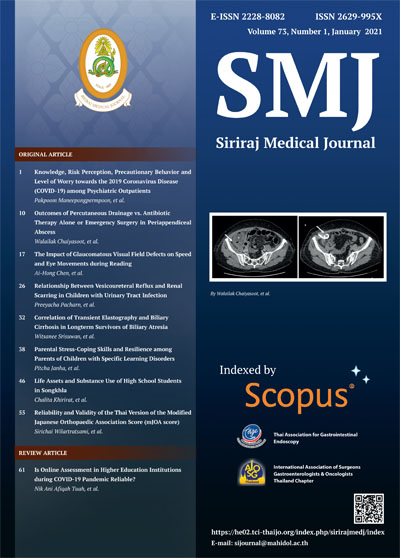Parental Stress-Coping Skills and Resilience among Parents of Children with Specific Learning Disorders
Keywords:
Parenting stress, coping, resilience, specific learning disordersAbstract
Objective: Parental stress may affect parents’ health, behavior, and children. The use of coping styles and resilience can help parents handle stress. The aim of this study was to examine the relationships among the demographic data, coping styles, resilience, and stress levels of the primary caregivers of children with Specific Learning Disorders (SLD).
Methods: 160 primary caregivers of children aged 6 to 17 with SLD who attended the Child and Adolescent Psychiatric Clinic at Siriraj Hospital were asked to complete the four-part questionnaires. The data were analyzed to find any correlations.
Results: 91.9% of participants had parenting stress at a typical stress level, and 68.8% were rated normal on the resilience quotient. With regard to coping style, the participants rated highest in problem-focus coping (mean score 3.8 ± 0.5), followed by seeking social support (3.0 ± 0.8), and avoidance (2.3 ± 0.6). The score on the Parenting Stress Index correlated with social support (r = 0.207, p < 0.01) and avoidance (r = 0.538, p < 0.01). The resilience quotient score demonstrated a negative association with parenting stress (r = –0.291, p < 0.01), emotional stability (r = –.0.242, p < 0.01), encouragement (r = –0.297, p < 0.01), and problem-solving (r = –0.189, p < 0.05).
Conclusion: Most of the parents had typical stress. Social support and avoidance -coping skills were significantly correlated with parenting stress and resilience. This suggests that one’s coping style and resilience are crucial to parents’ or primary caregivers’ quality of life.
Downloads
Published
How to Cite
Issue
Section
License
Copyright (c) 2020 Siriraj Medical Journal

This work is licensed under a Creative Commons Attribution-NonCommercial-NoDerivatives 4.0 International License.
Authors who publish with this journal agree to the following conditions:
Copyright Transfer
In submitting a manuscript, the authors acknowledge that the work will become the copyrighted property of Siriraj Medical Journal upon publication.
License
Articles are licensed under a Creative Commons Attribution-NonCommercial-NoDerivatives 4.0 International License (CC BY-NC-ND 4.0). This license allows for the sharing of the work for non-commercial purposes with proper attribution to the authors and the journal. However, it does not permit modifications or the creation of derivative works.
Sharing and Access
Authors are encouraged to share their article on their personal or institutional websites and through other non-commercial platforms. Doing so can increase readership and citations.











